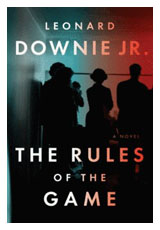The Rules of the Game By Leonard Downie Jr. | Knopf | 336 pages, $26.95
Leonard Downie Jr. knows newspapers. Last year, he stepped down as executive editor of The Washington Post, a position he held for seventeen years. For more than two decades before that, he served the paper in multiple roles, including investigative reporter, London bureau chief, and managing editor. He has also authored or coauthored four nonfiction books on the subject, from The New Muckrakers (1976) to The News About the News: American Journalism in Peril (2002).
 Only now, however, has Downie approached his subject from the angle of fiction. And The Rules Of The Game is unmistakably a journalist’s novel, the sort of story in which even conversations between lovers remain on background, deep background, or entirely off the record.
Only now, however, has Downie approached his subject from the angle of fiction. And The Rules Of The Game is unmistakably a journalist’s novel, the sort of story in which even conversations between lovers remain on background, deep background, or entirely off the record.
At the center of the narrative is Sarah Page, a precocious and attractive young reporter at The Washington Capital. After an affair with her former editor, Page finds herself sent upstairs from local politics to the national desk, where she is tasked with covering the movement of money in Washington politics.
This is, to say the least, a hefty bailiwick. But Sarah keeps returning to Trent Tucker, a high-powered lobbyist working for the Democrats, who does a brisk business in buying and selling political clout. As her reporting connects Tucker to a company called Palisar, she finds deeper, more pervasive corruption: there are large-scale cover-ups involving contracted security operations, extending from the Capitol to the Middle East.
She has stumbled into dangerous terrain. A series of threatening, late-night phone calls warns her that any further meddling will endanger national security, not to mention her life. One of her sources is murdered. Another, the seemingly omniscient Pat Scully, peppers her with instant messages, many of them warnings of one kind or another.
Catching sight of a stranger dressed unlike the rest of those lining the pews at the funeral of her murdered source, Sarah addresses him in a whisper:
“Listen to me,” she said to him, “I’m a reporter for the Washington Capital. My name is Sarah Page. Write that down. Tell whoever you’re working for that I’m going to find out what happened to Seth Moore. And I’m keeping my editors informed, just in case something happens to me.”
Working alone, Sarah must evaluate exactly how much information to exchange at any given moment—and not just with sources, but with colleagues and lovers. (Her gift for romantic imprudence doesn’t make the situation any easier.) Downie expertly describes the investigative reporter’s endless dance of quid pro quo; it dictates almost every movement of the protagonist’s life.
As a well-choreographed thriller, The Rules of the Game is frankly about story, rather than the subtleties of character; it is about the plot, and its precision, pacing, and detail, not the elegance or inelegance of prose. The declarative sentence—the plain language of the A1 lede—keeps the story moving fast:
Mark told him the identities of two of his sources, who would not be named, and left Jeanne out of it. Jones quickly read the story on his computer and woke his bosses before calling Daniels back to tell him to go ahead. Minutes later, just after 8 a.m. in Chicago, the story appeared on washingtoncapitcal.com.
What gives the book its power is Downie’s credibility. After four decades of observing and occasionally even acting in the production that is American politics, he understands who is beholden to whom in the White House, from press secretary to president to the lowliest of aides. He grasps the mechanics and planning involved in a leak, and how political journalists must be equipped with the same parry-thrust accuracy as anyone in office. While his characters may be thinly sketched, the texture of their lives and personalities vague, it seems unlikely that a reader will find himself sighing, “That would never happen.”
Indeed, it’s hard not to collate the behavior of Lou Runyon, the paper’s tough, scrupulous editor (modeled somewhat on Ben Bradlee) with that of the author himself. Earlier in his career, Downie oversaw coverage of Watergate. More recently, he went forward with stories about CIA prisons in Eastern Europe in specific defiance of the Bush administration. Even a fictional treatment of these matters, from such an apt and credible source, becomes a rather delicious off-the-record rarity.
The book even details a presidential election in which the older, male candidate selects a younger, glamorous, inexperienced woman as his running mate. “I can’t remember a presidential nominee being upstaged like this at his own convention,” a colleague tells Sarah Page. This fictional ticket resonates so eerily with the McCain/Palin campaign that readers will wonder about the publisher’s production schedule (the finished book hit the stores in early January of this year.)
Beyond the pleasure of voyeurism, though, Downie conveys the thrill and privilege of just being there. A White House volunteer in The Rules of the Game puts it this way: “It was fun, a game with its own unique rules, which sometimes included intimate relationships confined to the campaign, away from what insiders referred to as ‘real life.’”
In the end, Downie’s novel satisfies the myth of the reporter as a stubborn, insatiable, and often alienated guardian of democracy, one whose work can slip thrillingly into the territories of the detective or the spy. In his debut as a novelist, Downie retains both spirited optimism and enthusiasm for the ideals his profession requires. And readers may take private pleasure in trying to match the fiction with the all the facts surrounding its author’s impressive career.
Caroline H. Dworin is a writer in New York.
